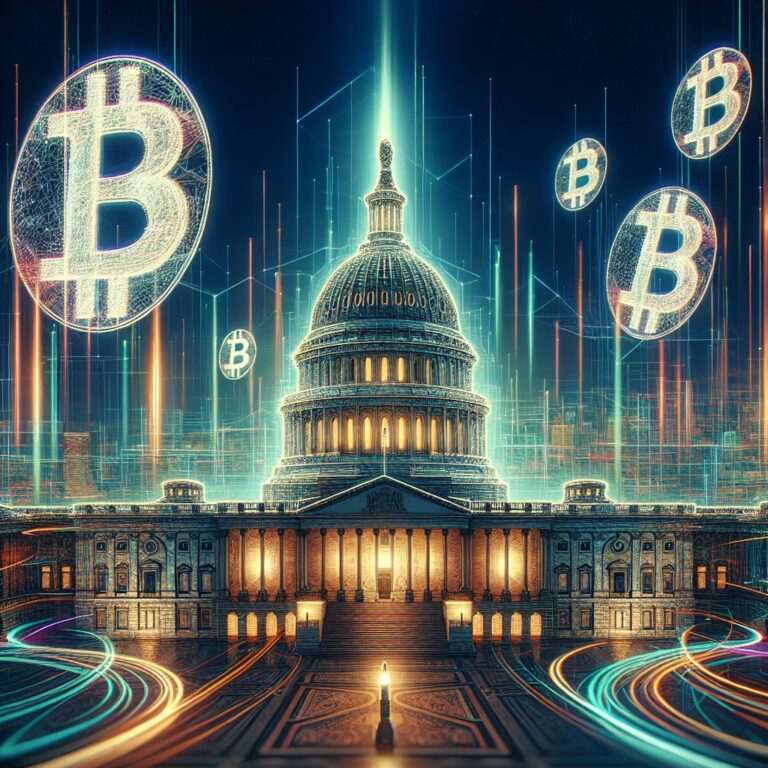In a push to fortify the United States’ strategic Bitcoin reserves, VanEck’s head of digital assets, Matthew Sigel, has underscored the necessity of legislative action. Speaking at the Bitcoin 2025 conference in Las Vegas, Sigel proposed embedding Bitcoin mining incentives into congressional budgetary processes, suggesting that such a legislative pathway could circumvent the legal quagmires often triggered by executive actions.
Legislative Maneuvering: A Strategic Path
Sigel, revered for his incisive commentary on digital assets, argued that Congress should consider amendments aimed at nurturing a sustainable Bitcoin reserve. He proposed tax credits for mining entities utilizing eco-friendly methods, like methane gas, as a potential carrot to entice miners to contribute a share of their BTC to the federal coffers. “We need a legislative framework that encourages organic growth of the reserve,” Sigel asserted, hinting that executive orders might invite legal challenges, especially from prominent critics like Senator Elizabeth Warren. This sentiment echoes the broader legislative challenges highlighted in U.S. Congress Braces for Intense Debate Over Crypto Legislation This Summer.
His comments resonate in the wake of former President Donald Trump’s executive order, which laid the groundwork for the U.S. Bitcoin Strategic Reserve. The order, issued on March 7, mandates that Bitcoin acquisitions must be budget-neutral or achieved through asset forfeiture. This constraint has sparked a flurry of innovative proposals to enhance the nation’s Bitcoin stockpile, currently sitting at nearly 200,000 BTC.
A Budget-Neutral Approach
Wyoming Senator Cynthia Lummis, an early advocate for a Bitcoin reserve, has championed a novel approach that avoids taxpayer burden: converting portions of the U.S. Treasury’s gold certificates into Bitcoin. Her proposal aligns with the principle of budget neutrality, a cornerstone of the current administration’s fiscal policy. “By revaluing our gold reserves, we can pivot towards a digital reserve without additional taxpayer expense,” Lummis explained.
Echoing Lummis, Bo Hines, executive director of the President’s Council of Advisers on Digital Assets, has advocated for the U.S. Treasury to reassess its gold holdings, presently valued at a mere $42.22 per troy ounce. With gold prices soaring to $3,500 per ounce in April before a slight dip to $3,300 by May 27, the potential windfall from revaluation could be substantial. Hines emphasized that converting these gains into Bitcoin would maintain fiscal prudence while augmenting the nation’s digital assets.
Navigating the Political Landscape
The dialogue around growing the U.S. Bitcoin reserve highlights the intricate dance between innovation and regulation. Analysts suggest that strategic legislative adjustments could pave the way for a more robust digital asset policy. However, the path is fraught with political obstacles. Lawmakers remain divided over the role of cryptocurrencies in the national economy, a division that could stymie efforts to secure legislative support. This division is further explored in Bitcoin is a matter of national security — Deputy CIA director, which discusses the implications of digital assets on national security.
The broader implications for the cryptocurrency market are significant. A successful expansion of the U.S. Bitcoin reserve could bolster Bitcoin’s legitimacy and stability, potentially driving broader adoption. Yet, it also raises questions about governmental influence in decentralized networks—a core tenet of the crypto ethos.
As the debate unfolds, one thing is clear: the quest to bolster the U.S.’s Bitcoin reserves is as much about navigating political realities as it is about financial strategy. Whether Congress can craft a viable path remains to be seen, leaving market watchers and policymakers alike pondering the future of digital assets in America’s economic arsenal.
Source
This article is based on: Growing BTC reserve requires Congressional legislation — VanEck exec
Further Reading
Deepen your understanding with these related articles:
- Arizona Governor Calls Crypto an ‘Untested Investment,’ Vetoes Bitcoin Reserve Bill
- Trump’s Crypto Sherpa Bo Hines Says Crypto Legislation on Target for Quick Completion
- Metaplanet Registers U.S. Treasury Arm to Grow Its Bitcoin Reserve Strategy

Steve Gregory is a lawyer in the United States who specializes in licensing for cryptocurrency companies and products. Steve began his career as an attorney in 2015 but made the switch to working in cryptocurrency full time shortly after joining the original team at Gemini Trust Company, an early cryptocurrency exchange based in New York City. Steve then joined CEX.io and was able to launch their regulated US-based cryptocurrency. Steve then went on to become the CEO at currency.com when he ran for four years and was able to lead currency.com to being fully acquired in 2025.


